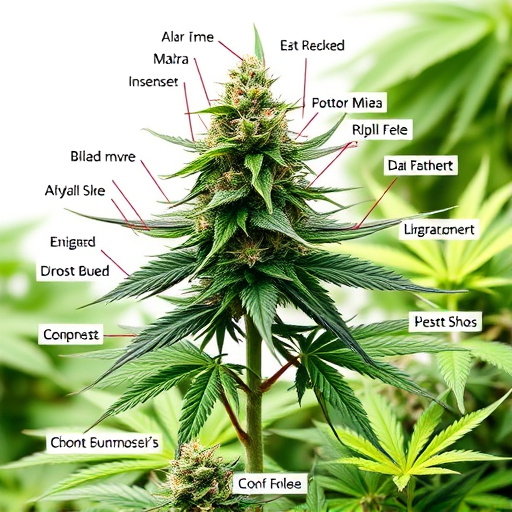The science behind cannabis and brain function reveals a complex interaction between cannabinoids like THC and CBD with our endocannabinoid system. Different strains of medical cannabis offer diverse benefits, with Indica varieties calming anxiety and insomnia, Sativa strains enhancing creativity and cognitive functions, and hybrids combining both. Tailoring intake to specific cannabinoids and terpenes enables individuals to support optimal brain function and mental well-being. Regular use may lead to dependence or tolerance, highlighting the need for careful guidance from healthcare providers.
Cannabis has long been a subject of interest due to its potential impact on brain function. This article explores the science behind cannabis and how it enhances cognitive processes, delving into the diverse strains of medical cannabis and their unique effects. We’ll discuss potential benefits, from improving focus and memory to managing neuropathic pain, while considering crucial factors for safe and effective usage. By understanding the latest research and exploring different strains, individuals can make informed decisions regarding their well-being.
- The Science Behind Cannabis and Brain Function
- Different Strains of Medical Cannabis and Their Effects
- Potential Benefits and Considerations for Usage
The Science Behind Cannabis and Brain Function

The science behind cannabis and brain function is a fascinating area of study that has gained significant attention in recent years. Research suggests that certain compounds found in medical cannabis, particularly cannabinoids like THC (tetrahydrocannabinol) and CBD (cannabidiol), interact with our endocannabinoid system. This complex network of receptors and enzymes plays a crucial role in regulating various physiological processes, including mood, memory, and cognitive function.
Different strains of medical cannabis have been shown to offer unique benefits for brain health. For instance, high THC strains are known to enhance creativity and improve focus, while CBD-rich varieties have anti-inflammatory properties that may reduce anxiety and promote better sleep. By understanding the specific cannabinoids and terpenes present in various strains, individuals can tailor their intake to support optimal brain function and overall mental well-being.
Different Strains of Medical Cannabis and Their Effects

Cannabis, with its diverse range of chemical compounds known as cannabinoids, offers a vast array of potential therapeutic benefits, and this is largely attributed to the unique properties of its various strains. Each strain of medical cannabis possesses distinct characteristics, leading to varied effects on brain function. For instance, Indica strains are renowned for their relaxing and calming effects, making them popular for treating anxiety, insomnia, and pain. On the other hand, Sativa varieties are known to stimulate mental activity and enhance creativity due to higher levels of THC, which can boost mood and cognitive functions.
The benefits extend further with hybrid strains combining traits from both Indica and Sativa. These blends can offer tailored effects for specific needs, such as boosting focus and energy while providing relaxation. The terpene profile—the aromatic compounds in cannabis—also plays a significant role in the overall experience, adding another layer of customization to the potential therapeutic applications of different strains of medical cannabis.
Potential Benefits and Considerations for Usage

The potential benefits of medical cannabis usage are attracting increasing interest from both researchers and patients. Studies suggest that certain strains of medical cannabis can enhance brain function, alleviate symptoms associated with conditions like anxiety, depression, and chronic pain, and even improve cognitive performance. The active compounds in cannabis, notably THC (tetrahydrocannabinol) and CBD (cannabidiol), interact with the endocannabinoid system to modulate mood, memory, perception, and other physiological processes.
However, considerations for usage are paramount. Different strains of medical cannabis have varying ratios of THC to CBD, which can significantly impact effects and potential side effects. High THC content may induce anxiety or paranoia in some users, whereas CBD-rich strains tend to offer therapeutic benefits with minimal psychoactive effects. Additionally, regular use can lead to dependence or tolerance, necessitating careful monitoring and guidance from healthcare providers.
Cannabis, with its diverse strains, offers a fascinating glimpse into enhancing brain function. Understanding the science behind its effects empowers informed decisions regarding its potential benefits. The various strains provide unique profiles, each with specific impacts on cognitive abilities and overall well-being. While considerations for usage must be taken seriously, exploring these natural compounds could unlock new possibilities for brain health and performance. Remember that further research is vital to unlocking the full potential of medical cannabis strains in promoting optimal brain function.














